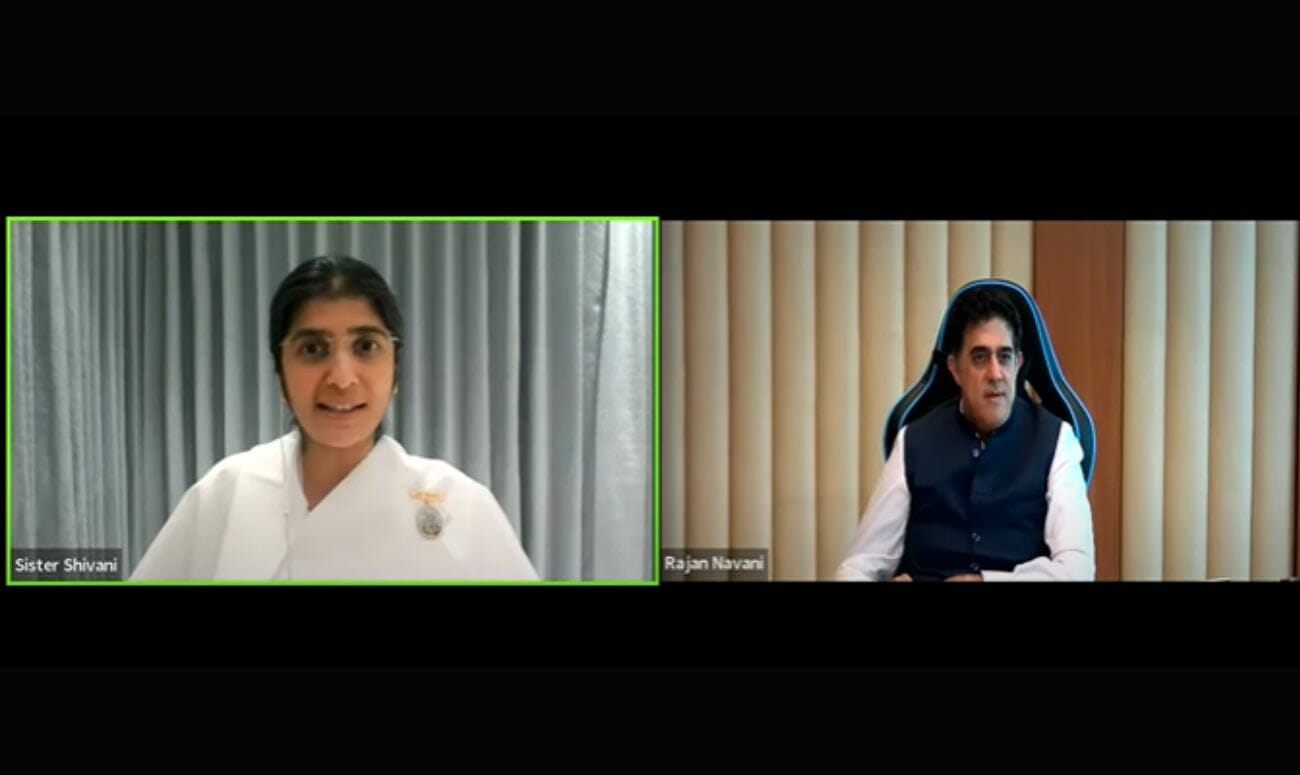World-renowned spiritual guide BK Shivani speaks with Rajan Navani, Chairman, CII India@75 Council and Founder & CEO, JetSynthesys on how spirituality can guide the path for a new India. She talks in detail about how we, as a society, must focus on certain internal aspects in order to progress as a country.
She observes, we’re working towards being Atmanirbhar or Self-Reliant as a country, but it also needs to be embraced on an individual level. As we journey towards Sone Ki Chidiya Bharat, the Golden Age of the Country, we’re transitioning back to what we were and not creating anything from the ground up. She explains that our foundation is already set but to truly embrace the Golden Age of India, we need to transition from the inside out. She expounds on the thought by quoting two Sanskrit sayings;
“Sankalp Se Shrishti.”
“Sanskaar Se Sansaar.”
The Golden Age of India will be created only when we, as individuals, support it with a culture that can lift it up. “When every soul will be in its highest spiritual quotient,” she professes. But how does one go about doing that? Let’s look at 5 important questions that were answered in this insightful webinar.
What Is the Role That Individuals Hold in Lifting India Towards Its Golden Age?
Our focus for the last 25 years has been on performing better as a country. New technologies have enabled us to become connected globally, leading us toward becoming a performance-centric society. However, performance is not everything. Performance is one part of success. Right from school, performance is proportional to success, but we need to make the shift of realizing that performance may be important, but the person is more important than their performance. Achievements are important but sanskaars are more important. So, in school, marks are important, but the child’s personality and values are more important. Similarly, in other aspects of society, in companies, families, and friendships, values should be valued more than achievements and performance.

How Do We Make This Shift from Performance-Centric to Value-Centric?
According to BK Shivani, this is not really a shift because we already have these values and sanskaars ingrained in us. It is who we were, all we must do is bring performance and values together. We need to learn not only about the outside world but also about the inside world. She talks about Swarajya which means self-management, ruling over our senses, our organs, and our minds. Self-management is the first step to managing other people. Whether it is the rules of the states in those days or the leader of a company today or even a parent guiding a child, all must begin with Swarajya. We’ve achieved Swarajya over the country, now we need to practice Swarajya over ourselves. “Am I a ruler over myself?”
How Will India Shape the World as We Become India@100?
“India will not become a superpower but a super partner. Partner to every country in the world in some shape or form,” affirms Rajan Navani as he explains how India hopes to contribute globally. For years, India has been the place where people from around the world have come to strengthen their spiritual quotient. BK Shivani agrees that we need to go back to being that safe space for people, a place where people can find the guidance to master their inner world and in turn take control over their outer world.
Does Our Behaviour Have the Power to Shape the Country?
BK Shivani affirms that the Golden Age of Bharat needs to begin with “soul consciousness”. Today, we are “role conscious”, “possession conscious”, “gender conscious”, “age conscious”, and “religion conscious”. While this may be important, we need to shift toward focusing on the “atma” which means our soul. To be atmanirbhar, we need to accept our soul as the energy that guides the mind and the body. We need to perceive everyone as the same soul instead of how they materialistically define themselves. Peace, love, compassion, and unity are our nature and our culture, regardless of our role, gender, age, caste or religion. Dharma is the religion, the duty of the soul; to be peaceful, loving, kind, united and compassionate.
How Being a Giver is the True Meaning of Being Atmanirbhar?
BK Shivani redefines the meaning of being atmanirbhar by explaining that we, as souls, need to remember that happiness, love, power, peace, equality, and compassion are all in our nature, these are our sanskaars. We only need to bring our sanskaars in our behaviour. In today’s society, we want to buy things to be happy, we want to achieve things to feel successful, we are in relationships seeking love, we are in superior roles to achieve power, and much more. We need to remember that these qualities are already in us. In our “role consciousness”, we’re looking for these sanskaars in the outside world when they’re already present in our inside world. To be atmanirbhar is shifting from “wanting” and “needing” to “giving”. To not be dependent on situations and people, to be who we are in nature, to be happy, peaceful, compassionate, graceful, etc. This is called practicing Seva Bhav or servitude.
Watch the complete conversation below.
Read More: What are the Benefits of Mindfulness-Based Cognitive Therapy?
Like & Follow ThinkRight.me on Facebook, Instagram, Twitter, Pinterest and Telegram to stay connected.






























